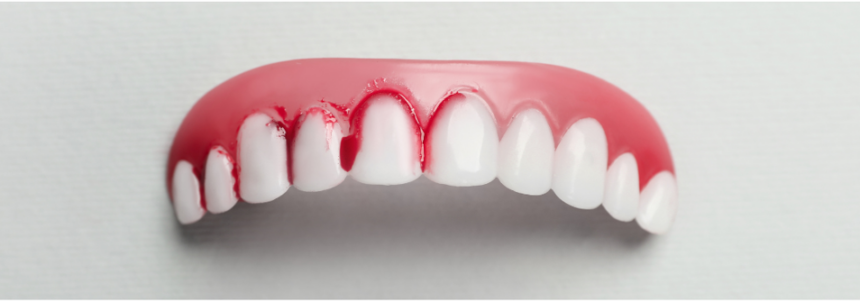Are bleeding gums normal?
The honest answer is no, healthy gums should not bleed. Bleeding gums is a sign that your
body is telling you something is wrong and it wants you to do something about it.
Why? The science…
In our mouths we have lots of bacteria, good and bad, which all work together as a community
called a dental biofilm. Throughout the day and overnight the biofilm will attach to the tooth
surface. It is then called plaque. The plaque needs to be removed by brushing and cleaning the
teeth twice a day. Brushing the teeth alone removes 60% and flossing or using interdental
brushes removes the extra 40%. If the teeth and gums are not effectively cleaned the plaque
can collect at the gum line. It is the plaque (which sometimes we can feel on our teeth – the furry
feeling!) that causes the gums to become aggravated and inflamed. Our immune body response
responds to this by pumping more blood to the gums to try and clear the plaque. There is now
more blood closer to the surface of the gums, making them more delicate. So when you brush,
the gums will bleed.
Are bleeding gums a sign of gum disease?
Yes, bleeding gums are an indication that you may have early onset gum disease. Most people
can get mild gum disease at some stage in their life. But, some people are susceptible to more
aggressive forms.
Can I reverse bleeding gums?
Often you can reverse early onset bleeding gums. The early stage of gum disease is called
gingivitis. Gingivitis is defined as reversible gum inflammation.
However, if bleeding gums are left untreated, it could turn into Periodontitis which we can never
fully totally get rid of but can stabilise. Your dentist or dental hygienist therapist will be able to tell
you what stage your gum condition is at by taking some measurements around your teeth and
gums.
What factors increase my risk of getting bleeding gums?
- Diabetes (especially if poorly controlled)
- Smoking
- Stress
- Poor Diet (lacking vitamins and minerals)
- Obesity
- Certain medications.
- Crowded teeth
- Menopause
- Pregnancy
- Pregnancy
Does gum disease give you pain?
No. Unlike other medical conditions or diseases which give you pain, gum disease can often go
unrecognised due to lack of pain. Some people may experience some sensitivity to hot or cold
foods.
What can I do?
Brush teeth 2x a day for at least 2 minutes
Floss or use interdental brushes 1x a day before brushing
Book an appointment with your dental hygienist/therapist.
What are the benefits of seeing a Dental Hygienist/Therapist?
Your gums will be healthier and you may notice the following benefits:
- Greater confidence in a fresher mouth
- Gums not being sore or bleeding when you brush
- Teeth becoming less wobbly
- Less discomfort when you eat
- You will keep your teeth for longer
What can you potentially diagnose within a hygiene appointment?
Your dental hygienist therapist will be able to tell you how healthy your gums are and if
there are any particular areas where the bleeding is coming from.
If your gum disease is advanced they will undertake detailed mouth mapping
measurements of your gums and advise how they can help you.
Pinpoint extrinsic factors which may be contributing to your bleeding gums.
What happens in a hygiene appointment?
First, your dental hygienist therapist will ask you some questions about your dental care
regime at home.
They will look into your medical history to see if there are any contributing factors from
medications you might be taking.
In depth information will be provided about why gums bleed and some prevention
measures you can undertake to keep gums healthy and prevent tooth decay.
You will next read through the risks and benefits of having a hygiene appointment on an
Ipad.
We use a gentle water ultrasonic cleaner on the teeth. Once you are laid back in the
chair we will test that this feels okay on a couple of teeth first.
We will clean all of your teeth. Sometimes more than 1 appointment will be required to
do this.
Once all teeth are clean, your dental hygienist therapist will polish your teeth with a
flavour of your choice.
Toothbrushing and interdental cleaning techniques (such as floss, interdental brushes)
and advice will be tailored and provided to you.
Is there anything I can do at home prior to my dental hygiene appointment?
Brush teeth 2x a day for a minimum of 2 minutes.
If using a manual toothbrush use small circular motions along the gum line.
If using an electric toothbrush hold the head over each surface of the tooth and gum for
3 seconds.
Don’t brush harder, just brush longer. Brushing hard can lead to worn down gums,
otherwise known as recession.
The gum line is the most important area to clean.
After brushing, spit out the toothpaste, but do not rinse with anything afterwards. This
includes water and mouthwash.
Your dental hygienist therapist will be able to recommend to you a toothbrush and
interdental cleaning product suited to you at your appointment.
If you are experiencing bleeding gums and wish to speak with our team to book an appointment, please
contact us on 01264 301301.
By Lauren Pink BSc (Hons) Dental Hygiene and Therapy


